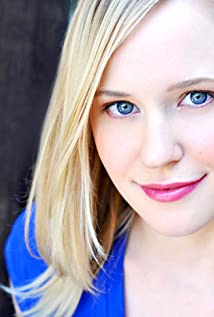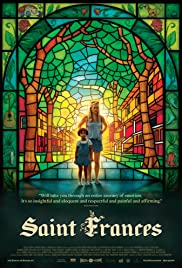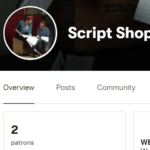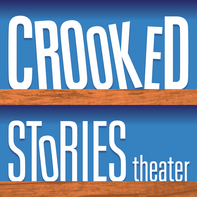We’ve seen plenty of prose writers venture into screenwriting here at Simply Scripts over the years. But until recently, it was far less common to see screenwriters making the leap in the other direction—shifting from script format to fiction. That trend seems to be accelerating lately, perhaps in part because studios are increasingly turning to novels and even short stories as source material for their next film projects.
As someone navigating that transition myself, I was eager to learn more about the process. And who better to ask than one of Simply Scripts’ longtime contributors who’s made that leap successfully?
—P.H.Cook
ABOUT THE AUTHOR
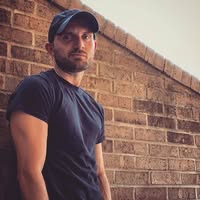 Chris Archeske has lived all across the United States and beyond, from Southern towns in Alabama and Georgia to more far off localities including Hawaii and Germany. A lover of all things horror, he grew up reading the Goosebumps series and still has his collection of the original sixty-two books. Aside from R.L. Stine, he enjoys and is inspired by the works of Richard Matheson, Stephen King, Eric LaRocca, Daphne du Maurier, John Saul, and Stephen Graham Jones. Today, you can find him in Iowa with his husband and their four cats.
Chris Archeske has lived all across the United States and beyond, from Southern towns in Alabama and Georgia to more far off localities including Hawaii and Germany. A lover of all things horror, he grew up reading the Goosebumps series and still has his collection of the original sixty-two books. Aside from R.L. Stine, he enjoys and is inspired by the works of Richard Matheson, Stephen King, Eric LaRocca, Daphne du Maurier, John Saul, and Stephen Graham Jones. Today, you can find him in Iowa with his husband and their four cats.
Which came first, the screenwriting or the book writing, and when did you start?
I started writing in the third grade. I had an amazing teacher named Mrs. Niino, and she really pushed me to think creatively.
I remember one lesson where we read two short but separate books back-to-back, and then when we were finished, she posed questions to us like, “What if the characters from Book A met the characters from Book B? Would they get along with each other? What if they swapped houses for a week? etc. ” This got the creative gears in my brain turning, and they just never stopped.
General prose writing came first. My dad gave me his old computer when I was 10, and it was this relic with Windows 95 and no internet access. It basically had Paint, Solitaire, and Chess, and I taught myself how to use all three out of necessity more than interest. Then, when I had tired of those, I discovered the computer also had Microsoft Word, and that’s where I realized I had an entire resource at my fingertips to write my own stories.
I didn’t start screenwriting till high school. I found SimplyScripts.com through a Google search (to be more specific, I was looking for Kevin Williamson’s screenplay for Scream, which was a favorite of mine and a huge influence on the kind of stories I wanted to tell). I discovered there was an entire selection of unproduced scripts on the site, plus a forum for aspiring writers to give and receive feedback on their own stuff. That really motivated me to try my hand at screenwriting. I downloaded Celtx, a free formatting software, bought The Screenwriter’s Bible by David Trottier so I could learn the essentials, and the rest is history.
Which format do you prefer, and why?
I enjoy both equally, but it usually depends on the story I’m wanting to tell. I like how simple and clean screenwriting is. There are general “rules” to follow that, for me, make it much easier to write scripts. Sometimes it’s just nice to color inside the lines.
On the other hand, I like how involved and detailed prose can be. There’s no limit to what you can say or do, but this also makes it much harder—and more time-consuming—to put words to paper. Your mind is your only limit, and that can be very daunting.
I loved your book, The Bad Things We Did, but I understand you had written a few books before that one. What inspired you to move from screenwriting to prose?
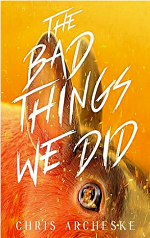 Well, first, thank you so much! I’m glad you loved the book!
Well, first, thank you so much! I’m glad you loved the book!
Screenwriting is a fiercely competitive market, and it was often impossible to get anyone to read something I’d written—let alone produce it!
I felt discouraged dealing with the constant rejection in writing screenplays, and it was especially disheartening that I wasn’t getting any type of feedback at all. In general, writers write so their stories can be read, and if you don’t have someone reading your story, you can really feel like you’re doing it for nothing.
Right before the pandemic, I’d hit rock bottom. Lost my job. Lost my apartment. Lost my relationship. I felt like everything important to me was being taken away. So I told myself, “Write something that no one can take away from you. Write something that doesn’t require a yes from anyone else. Be your own yes.”
So that’s what I did. I wrote and self-published my own book.
How did your screenwriting background influence your approach to writing a novel?
Screenwriting has had a major impact on the way I write books. Pacing, flow, dialogue, visual and sound cues—all of it plays a major part in the way I tell stories. I often hear from readers, “It feels like I’m watching a movie while reading this.” And that’s one of the best compliments I can get.
What were the biggest challenges in shifting from scripts to prose? Did you have to unlearn any screenwriting habits when writing your book?
The biggest challenge for me was unlearning the rule of avoiding “unfilmable” descriptions. With prose writing, I could dive into my characters’ backstories and thoughts and feelings, and that was massively intimidating. I’d taught myself to write only what could be seen and heard for so long, and suddenly, I could write about literally anything! It was the equivalent of swimming in the kiddie pool for years and then abruptly diving into the deep end. Would I sink or swim? Luckily, I swam.
Are there any techniques from screenwriting that you found particularly useful in prose?
One thing I was taught in screenwriting is that there should be as much “white” on the page as possible—a page that’s easy on the eyes, if you will. No one wants to pick up a script and see blocks and blocks of lengthy passages. I’d say it’s the same mentality for books. Most people are inclined to pick up (and read) a book that’s easy on the eyes versus one that might be a little more challenging. So I’m glad I had that screenwriting background to craft a book that is (hopefully) effective in that regard.
How does your writing process differ when working on a novel versus a screenplay? Do you outline your stories differently for prose than you would for a script?
Not differently, but I don’t outline as often when writing a book. I have a general idea of the story and all of its major components, but I don’t feel it necessary to have a scene-by-scene reference to adhere to. Sometimes, I’ll even write the story in a nonlinear way, which is tons of fun.
How do you approach writing descriptions in prose, given that screenwriting is so visual yet so minimal in detail?
Great question! I’ll often start by writing a description you might see in a screenplay. Basic visual, sound, and action cues. Then I’ll think about aspects to the description that a movie wouldn’t be able to include. What does it smell like? How does it feel? What does the character think about it? Etc.
Do you find dialogue easier or harder in prose compared to a script?
It’s about the same for me. When I was actively writing screenplays, I once heard someone say, “I should be able to take away the name of the person talking, and I should still know who’s speaking.” Meaning: the dialogue should be a reflection of the character’s personality. That always stuck with me, and I’ve carried it with me when writing books as well.
Do you still think in terms of scenes when writing prose, or has your storytelling approach changed?
I still see the scene playing like a movie in my head. I write down everything that’s happening in the moment. Then, once that’s put to paper, I go back and add details a movie wouldn’t be able to include.
Your books are horror. Do you write in other genres as well?
I tend to write mostly in the horror and thriller genres, often with a touch of LGBTQ influence. But I’m open to writing in other genres as well. I’ve often thought about writing a romantic comedy one day. I don’t necessarily believe in sticking to one particular “brand.” If it’s a story I like and believe in, I’ll write it.
Is there any difference in writing horror scripts compared to prose? In films, visuals and sound are very important, but you don’t have that in books.
Horror is very psychological. While you may not physically see the horror or hear the sounds when reading a book, your mind can conjure up the image and accompanying sound all on its own. This is why producers can read a horror script and say, “This is going to scare the shit out of people.” Because their own mind has created the horror just by reading the words on the page.
Do you find it easier to build suspense in prose than in a screenplay?
They’re about the same. With both, it’s about teasing the reader, just enough to keep them guessing but not enough so they’ll figure things out and lose interest. It’s a balancing act.
What horror influences shaped your writing style? Movies, books, or both?
Both! I like to think that screenwriting was my solid foundation for a house, and prose writing was the actual construction of the home—the framework, wiring, insulation, flooring, etc. But without that foundation from screenwriting, the house would crumble.
Did you go the traditional or self-publishing route, and why?
I self-published. I wanted total creative control of my book, and I didn’t want anyone else to have the ability to stop it from reaching readers. I wanted it to happen.
How did you market your book as a debut novelist?
I was as annoying as possible! I talked about the book with anyone and everyone. I joined book clubs, social media groups, reached out to influencers, etc. I sent out advanced reader copies to build some buzz before its release. I even guest hosted on a podcast and talked about it there. I found every opportunity I could find, including ones where there shouldn’t have been one!
What was your experience with publishing like?
It’s been pretty great. I was really excited to hire and work with my own editor and cover designer. I also purchased my own book formatting software and taught myself how to use it, which will be valuable for future book releases. The only thing I wasn’t totally prepared for is how expensive publishing is. It all adds up very quickly.
In screenwriting, you have the writer create a story, then a film production company makes the film, and then the film is shown to an audience, often very different than the original script. With books, you’re telling your story directly to the audience/the reader. Is that something that you, as a writer, can feel the difference in? That there’s no third party distorting your work before the end consumer.
Absolutely! As you mentioned, things change in the time a screenwriter types THE END to the moment an audience is finally watching the story on a screen. Things can be changed due to creative choices, or maybe they were choices that were dictated by budget or unforeseen circumstances.
I’ll give you an example.
In 2012, I wrote a short script called “Hiccups.” It was about a couple trying to go to sleep at night, but the girlfriend can’t stop hiccupping. So the fed-up boyfriend decides to hide somewhere in the house and scare her, effectively “curing” her of her hiccups — but he’s in for a scare of his own.
“Hiccups” was a basic ‘monster under the bed’ story, but I think it got a lot of interest because it was short, punchy, and cheap to film.
The script was quickly picked up by a film student (who found it on SimplyScripts, no less) and produced and released in the same year. I love the short film and think the director (Karson Holbrook) did a fantastic job with it, but one thing that was changed was how the monster in the story got the hiccups.
In my script, the monster under the bed eats the family cat too quickly (eating too fast is a common cause for hiccups). But in the film, the monster just gets the hiccups out of nowhere. It’s still effective overall and I understand why it was changed (the cat didn’t do what it needed to do), but for context, I felt like a plot detail was lost because of something out of anyone’s control.
With prose writing, I no longer need to worry about sacrificing parts of my story for budget, timing, or unforeseen circumstances. I’m in complete control, and that’s refreshing.
What advice would you give to screenwriters looking to publish books?
Read. Read often and as many books as you can. And don’t do it for the money! Even successful authors still have a day job.
Do you plan to write more novels, or do you see yourself going back to screenwriting?
Screenwriting is never off the table, but for now, I’m definitely writing more books! My first novella, Beau, will be out later this year, so keep your eyes peeled!
Were these stories written specifically for this collection, or were some of them already completed beforehand?
All but two of the stories were written specifically for this collection: “The Thing That Wasn’t” and “The Parachute.” I wrote “The Thing That Wasn’t” in 2009 and thought it’d be a perfect note to end the collection on. “The Parachute” was written for an open submission anthology that I never heard back from. In some ways, it was actually that publisher’s silence that motivated me to publish my own collection.
Where did the inspiration for these stories come from? Were they sparked by personal experiences, observations, or pure imagination?
My story ideas come from all over. “The Bad Things We Did” was inspired by my fascination with misunderstandings and how horrific they can be when not played for laughs. Some stories, like “The Thing That Wasn’t,” were inspired by real life experiences. Almost all of my stories are grounded in reality. I really enjoy taking an ordinary thing and finding a way to make it extraordinary.
How did you decide which story would open the collection, and what guided your choices for the overall story order? Was it about pacing, tone, or theme?
Entirely too much thought and energy went into setting up the order of the stories. Half of the stories I wrote for this collection featured children as the predominant characters, so it was important to space those tales out. Similarly, half of the stories involved ghosts and the supernatural, so it was equally important to pepper those throughout so things didn’t feel stale for the reader. And while all of the stories are scary in their own way, I wanted to make sure some of the more extreme stories were followed by something a little less traumatizing.
All the stories fall within the horror genre, but for me, the title story, The Bad Things We Did, felt like pure nightmare fuel—it really stuck with me. On the other hand, I was surprised by how much I enjoyed Mercy at the End of Her Life. I think anyone who’s dealt with an HOA will relate! Do you have a personal favorite among the stories? And have readers surprised you with which stories they connected with most?
Thank you so much! “The Bad Things We Did” is terrifying to me as well and might as well have been plucked from my worst nightmare. The idea of doing something so terrible to someone on accident is somehow even more upsetting than the intentionality behind most horror stories. I think that’s why this particular tale sticks with people. We can all identify with making a mistake that could’ve ended much worse than it did. I’ve heard from some readers that the story made them more grateful for their own life experiences, so that’s pretty cool.
Many of my readers have had different favorites from the collection, and that was a goal for me when writing it. I didn’t want one story to overpower the others. I wanted each one to hold its own. No filler stories whatsoever. They all needed to be bangers.
Which of the stories is my favorite? That’s tough to say. I truly love them all. Of the eight stories in the collection, I think the writing in “The Candy Cane Man” is probably the best, but I also enjoy the simplicity of “The Thing That Wasn’t” and the genuine fun of “The Parachute.” I guess my favorite depends on what mood I’m in!

